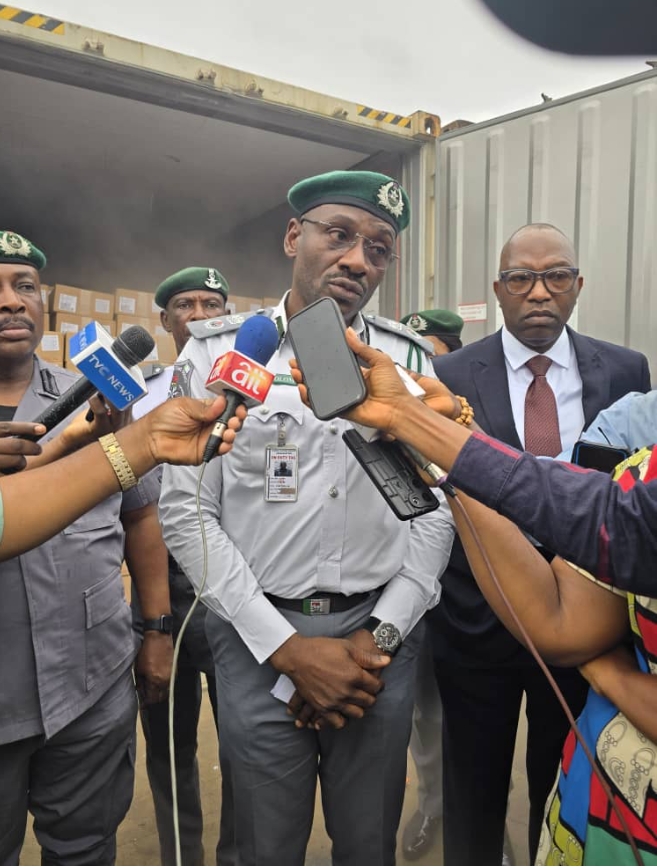Maritime Agencies
Resist Suggestions To Convert MAN, Oron, To A Conventional University, AMANO Appeals To President Tinubu

By Izuchukwu Ozoemena
Even as plans have gone far to convert the Maritime Academy of Nigeria, MAN, Oron, to a conventional university, the Alumni of Maritime Academy of Nigeria, Oron (AMANO) says the institution will serve a better purpose if it is allowed to maintain her current status as a specialized maritime training institution.
Therefore, the association has made a passionate appeal to President Bola Tinubu to preserve the specialized structure of the nautical school and resist any plans to convert it into a conventional university under the Ministry of Education.
In a letter signed by AMANO President, Emmanuel Maiguwa, the association lauded the Tinubu administration’s commitment to maritime development, citing the creation of the Ministry of Marine and Blue Economy and the recent signing of Nigeria’s Marine and Blue Economy Policy.
AMANO, however, expressed concern over the proposed conversion of MAN, Oron, highlighting significant risks associated with such a move.
They warned that a shift from its specialized framework could lead to a loss of international accreditation, as maritime training institutions must adhere to International Maritime Organization (IMO) regulations, particularly the Standards of Training, Certification, and Watchkeeping for Seafarers (STCW) Convention.
The alumni body also cautioned against the dilution of quality, arguing that maritime education demands specialized facilities, simulators, and expertise that a generalized curriculum might undermine.
This, they added, would lead to reduced global competitiveness for Nigerian cadets and pose national security risks by compromising the precision-trained personnel essential for maritime security and port operations.
“As proud graduates of the Maritime Academy of Nigeria, Oron (MAN Oron), and dedicated stakeholders in the maritime sector, we write with utmost respect and concern for the future of Nigeria’s maritime training architecture.
“The Maritime Academy of Nigeria, MAN Oron is a strategically vital institution, purpose-built to deliver specialised training in accordance with global maritime standards.
“For decades, it has equipped Nigeria’s seafarers, marine engineers, and navigators with the competencies required to serve our nation and compete internationally.
“We respectfully express concem over the proposed conversion of the Academy into a conventional university under the Ministry af Fducation This move, while perhaps well-intentioned, poses significant risks:
“Loss of International Accreditation: Maritime training institutions must conform to the International Maritime Qrganisation (IMO) regulations, particularly the Standards of Training, Certification, and Watchkeeping for Seafarers (STOW) Convention. A shift from ils specialised framework could lead to a loss of certification and recognition.
“Dilution of Quality: Maritime education demands specialised facilities, simulators, and expertise. Generalisation may undermine the quality of training and safety outcomes.
“Reduced Global Competitiveness: The Academy equips graduates to compete in the global maritime labour market. Weakening its focus would disadvantage Nigerian cadets on the international stage.
“National Security Risks: Maritime security and port operations require precision-trained personnel. Specialised institutions like MAN Oron are critical to sustaining these competencies,” the letter reads in part.
AMANO urged Tinubu’ to retain the Academy under the Ministry of Marine and Blue Economy to ensure training remains aligned with sectoral needs, policy direction, and maritime strategy.
“Reinforcement of the Academy’s Specialized Structure: MAN Oron should continue operating within the STCW framework, supervised by the Nigerian Maritime Administration and Safety Agency (NIMASA), with a focus on producing world-class maritime professionals.
“Flexible Degree-Awarding Structure: Degree programs should reflect specific maritime manpower needs, potentially through academic partnerships akin to the Nigerian Defence Academy model,” it said.
AMANO further noted that Nigeria already has a Maritime University in Okerenkoko, which has faced challenges operating outside the direct oversight of the sector-specific ministry.
They also pointed out that several conventional universities already offer maritime-related degree programs under the Ministry of Education.
“Mr. President, the Maritime Academy of Nigeria, Oron, is not just an academic institution—it is a strategic national asset. To weaken its foundation is to compromise Nigeria’s future in the global maritime domain.
“Preserving its specialised mandate is essential for safequarding our national interests, advancing the blue economy, and secunng sustainable jobs for our youth.
“We trust in your leadership and are confident that your administration will uphold Nigeria’ s vision for a strong, competitive, and secure maritime future,” AMANO concluded.
Customs
Ogun 1 Customs Hosts FAED 2026, Highlights Gains of Cross-Border Cooperation, Economic Empowerment and Entrepreneurial Development.

By Izuchukwu Ozoemena
The Acting Customs Area Controller (CAC), Ogun Area 1 Command of the Nigeria Customs Service, Deputy Comptroller O.O.Afeni says the Festival of Arts For Economic Development (FAED) continues to reflect a shared understanding that sustainable border management goes beyond enforcement to encompass cross-border cooperation, economic empowerment and entrepreneurship development within the border communities.
Deputy Comptroller Afeni spoke at the Idiroko Border, Thursday, while declaring open the international colloquium to mark the 5th edition of the Festival of Art for Economic Development to which the Nigeria Customs Service is a strategic partner.
He said: “The theme, ‘Rebranding Borderline Communities through Creative Empowerment and Entrepreneurship,’ aligns with the Nigeria Customs Service’s commitment to supporting legitimate trade, encouraging value addition, and promoting small-scale enterprises as drivers of economic growth and border stability.
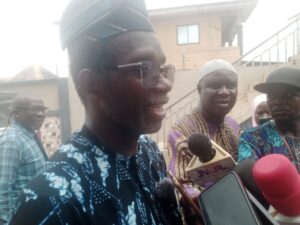
Dr Bonny Abisogun Botoku, Executive Producer, FAED.
He acknowledged the important role of the Nigeria–Benin Inter-Border Forum, under the leadership of its Permanent Secretary, Dr. Bonny Abisogun Botoku in advancing preventive diplomacy, structured dialogue and operational cooperation between Nigeria and the Republic of Benin.
”Through the empowerment programmes and entrepreneurship initiatives embedded in this Festival, we see practical pathways to reducing illicit activities, strengthening lawful commerce, and fostering inclusive economic opportunities for our people.”

Deborah Chiamaka Nwangene, one of the graduating trainees.
”The Nigeria Customs Service remains committed to partnerships that promote peaceful borders, resilient economies and sustainable regional integration.”
During a brief press chat, Comptroller Afeni spoke about enforcing government fiscal policies, saying that this must not be by force.
”The citizens must be made to know the reasons we are here. This is a way of showing the communities that we care about them. You can see that we have trained some people in the art of garri- making painting tye and dye (adire), etc. It’s a way of empowering the community.”
On suggestions that the seminar is capable of deepening cordial relationship between Benin and Nigeria, the CAC could not agree less.
”It is the fifth edition. It has been a situation we see the succeeding version getting better than the previous one. Today, I signed many certificates of people graduating. We’re not just training them; we’re empowering them so that we take them off the smuggling realm and make them better citizens.”
In his presentation, the Executive Producer of the Festival, Dr Bonny Abisogun Botoku described it as more than an event.
”It is a movement. It is a statement of belief—that border communities are not problems to be managed, but potentials to be unlocked.”
He recalled that for too long, border communities across Africa have been spoken about only in the language of risks exemplified in smuggling, insecurity, informality and marginalization.
”But those of us who live and work at the borders know a deeper truth. Borders are not just lines on maps. They are meeting points of culture, gateways of trade,
and spaces of shared history.

Sample of garri processed and packaged by a trainee.
”The Nigeria–Benin border is not a dividing line—it is a shared civilization. What we are doing through this Festival is to change the story from suspicion to trust, from survival to enterprise,
from isolation to integration.
Contrary to the widely-held belief that culture only concerns entertainment, he explained, culture is power, identity and economic capital.
”Through art, music, fashion, crafts, food systems, and storytelling, communities rediscover pride, cohesion, and voice.
Culture becomes a language of peace, dialogue, and diplomacy—especially in border spaces where differences must be managed with wisdom.
”This Festival deliberately places culture at the center of development, not at the margins.”
Distinguished guests at the event included the Onitaege of Itaege, HRM Oba Matthew Ademola Abisoye and other respected traditional rulers, government officials and representatives of security agencies. Others were partners from the Republic of Benin, artists, cultural practitioners and trainees.
Maritime Agencies
We’re Ever Proactive In Intercepting Prohibited, Falsely Declared Goods, says Controller Onyeka.
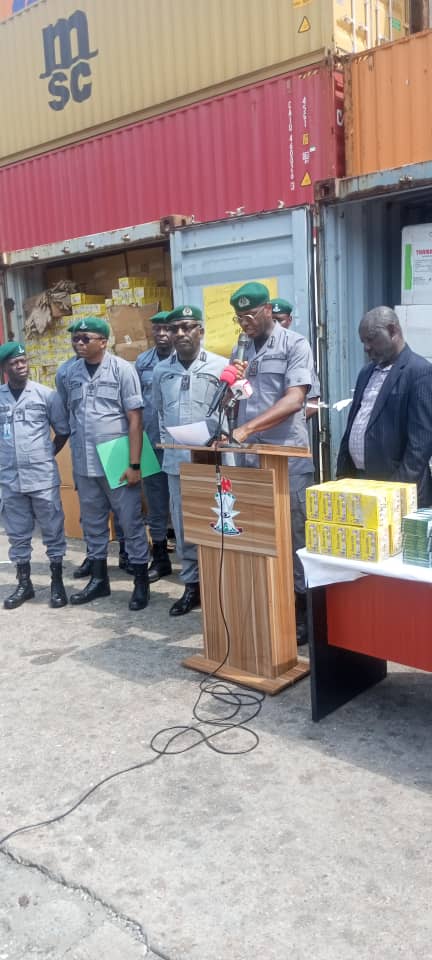
By Izuchukwu Ozoemena
In line with the core mandate of the Nigeria Customs Service, the Tincan Island Port Command is ever proactive in intercepting prohibited and falsely declared goods even as it remains committed to facilitate legitimate trade while contributing significantly to revenue generation.
The falsely declared goods include controlled pharmaceuticals, arms and ammunition, narcotics and other items capable of undermining public safety, security and stability.
The Customs Area Controller (CAC), Comptroller Frank Onyeka stated this in Lagos, Friday, while formally handing over three (3) units of 20 ft containers containing expired pharmaceutical products to the National Food and Drug Administration and Control (NAFDAC) for appropriate regulatory action.
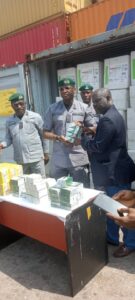
”The containers include two units with numbers PONU031958/6 and MSKU 711656/0 which were found to contain expired Tramadol tablets,” Onyeka announced.
”These consignments were thoroughly examined and the result revealed that the first container contained 86 cartons of Vingil Tramadol BP 50 mg while the second container held 250 cartons of the same expired Tramadol product”.
”The third container with number MSKU413519/1 was found to contain 370 cartons of expired Declofenac Sodium BP 50 mg tablets without a valid NAFDAC registration number, making the consignment illegal and dangerous for public use.”
Beyond these seizures, he explained, the Tincan Command has continued to record notable achievements in recent times through intensified cargo examination, improved intelligence gathering and sustained enforcement operations. These achievements are the result of deliberate strategies anchored on discipline, integrity and strong inter -agency collaboration.
He showed special appreciation to the operatives of NAFDAC for their consistent cooperation.
”Our synergy has continued to yield positive results particularly in ensuring that fake, substandard and expired drugs are intercepted before reaching the Nigerian populace.”
He equally commended officers and men of the Command for being resilient and committed to duty, a development that has continued to strengthen the credibility and operational effectiveness of the Command.
”Furthermore, I express our sincere appreciation to the Comptroller-General of Customs, Bashir Adewale Adeniyi, PhD, MFR, psc (+) for his purposeful leadership and strategic reforms which have empowered our operations.”
The CAC later handed over the prohibited pharmaceuticals to Mr Kareem Taiwo Adekunle, the Chief Regulatory Officer (Investigation and Inspection Directorate), NAFDAC, Apapa.
Maritime Agencies
Zone ‘A’ Coordinator, Mohammed Babandede, Visits Apapa Command, Commends Officers’ Sterling Performance.

By Izuchukwu Ozoemena
Officers and men of the Apapa Customs Command have received a special commendation for maintaining an exceptional performance in revenue generation, anti-smuggling operations and trade facilitation throughout 2025.
Mohammed Babandede, Assistant Comptroller-General of Customs (ACG) and Zonal Coordinator, Zone ‘A’ of the Nigeria Customs Service handed down the commendation during his familiarization visit to the Command, Thursday.
Chief Superintendent of Customs, Isa Sulaiman, the image maker of the Apapa Customs Command disclosed this in a press release.
Addressing officers and men during the visit, the image maker stated, the Zonal Coordinator explained that the purpose of his coming was to acknowledge the operational challenges faced by the Command, appreciate its notable achievements and further boost the morale of personnel who have consistently surpassed expectations, particularly in revenue collection where the Command exceeded its annual target.
”The ACG also lauded the Command’s sustained anti-smuggling efforts, especially the significant seizures of narcotics and other illicit substances including cocaine and tramadol, describing these interceptions as critical contributions to national security, public health and societal safety. ”
Effective enforcement, the ACG emphasized, remains fundamental to creating a secure environment for legitimate trade to thrive.
While noting that the core responsibilities of the Service extend beyond revenue generation to include national security, public safety and trade facilitation, the Zonal Coordinator commended the Apapa Command for its effective inter-agency collaboration. He urged officers to deepen cooperation with sister agencies, particularly in the deployment and promotion of trade facilitation tools that have positioned the Service at an upper-class operational rating.
The Zonal Coordinator further stressed the importance of integrity, reputational management, mentorship and capacity building within the Command. He urged senior officers to transfer knowledge and experience to younger officers while also drawing attention to the importance of officers’ welfare and health, disclosing that drug tests would be conducted across Commands. He advised officers to remain health-conscious for effective service delivery.
In his remarks, the Customs Area Controller, Apapa Area Command, Comptroller Emmanuel Oshoba, expressed appreciation to the Zonal Coordinator whose February 5 visit was motivating and timely. He reaffirmed the Command’s commitment to sustaining its performance in revenue generation, enforcement, trade facilitation, inter-agency cooperation and ethical conduct in strict adherence to the Nigeria Customs Service Act, 2023 and the policy thrust of the Comptroller-General of Customs, Dr Adewale Adeniyi.
-

 Customs3 weeks ago
Customs3 weeks agoKLT Customs Surpasses 2025 Revenue Target By a Wide Margin, Clamps Down on Expired Imports.
-

 Customs2 weeks ago
Customs2 weeks agoFreight Forwarders Warn FAAN To Halt New Charges In Airport Cargo Operations or Risk Rumble in the Sector .
-

 Maritime Agencies3 weeks ago
Maritime Agencies3 weeks agoOGUN AREA 1 CUSTOMS: Suspected Armed Drug Traffickers Mount Barricades, Attack Officers. Two Personnel Critically Injured.
-
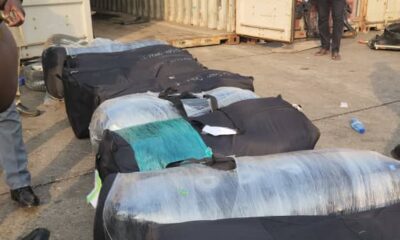
 Maritime Agencies3 weeks ago
Maritime Agencies3 weeks agoWAR AGAINST KILLER DRUGS: Apapa Customs, NDLEA Collaborate To Nab Huge Quantity of ‘Canadian Loud’.
-

 Customs3 weeks ago
Customs3 weeks agoLekki Deepsea Port: The Success Story of the Nigerian Ports Authority.
-

 Customs3 weeks ago
Customs3 weeks agoPTML Customs Hands Over Seized Arms and Ammunition, Collects N44.06bn in January.
-
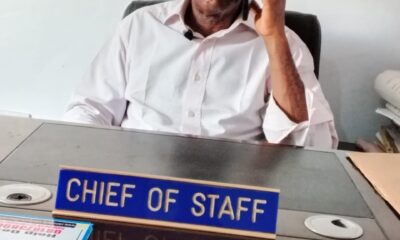
 Maritime Agencies3 weeks ago
Maritime Agencies3 weeks agoNAGAFF Compliance Team Set to Relaunch for Stronger Engagement, Enforcement.
-
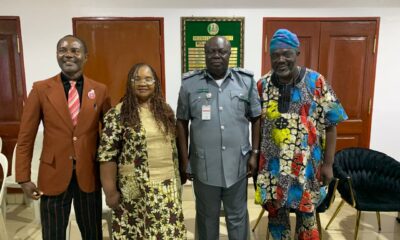
 Maritime Agencies3 weeks ago
Maritime Agencies3 weeks agoSeme Customs Raids Hideouts, Impounds 200 Bags of Smuggled Rice, Collects N2bn 3 Weeks into 2026.

























